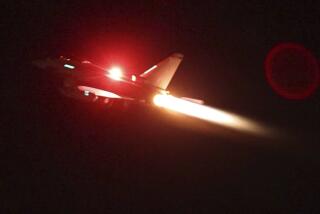A false sense of national security
The raid to kill Osama bin Laden is barely three months old, but already it is one of the proudest chapters in the history of the U.S. Special Operations Command — and of the Obama administration. Officials of both organizations have been taking one well-deserved victory lap after another, even going so far as to cooperate (apparently) with a journalist from the New Yorker who has just produced a riveting account of Operation Neptune’s Spear. No doubt more books, articles and movies are in the offing. I wouldn’t be surprised to see some Navy SEALs writing memoirs or licensing their stories.
There are two major problems with the understandable impulse to pop the champagne cork. In the first place, the officers and officials who are talking may well be compromising important operational details and making it harder to preserve secrecy about future missions — including those that don’t go quite as well. Even more worrisome is the possibility that we are being lulled into a false sense of complacency that will allow Al Qaeda and other radical groups to stage a resurgence.
U.S. government officials are probably premature when they rush to proclaim, as the Washington Post reported, that Al Qaeda is “on the brink of collapse.” Such predictions have been made many times before, and each time have been disproved by this terrorist group with its alarming ability to regenerate itself. It does not take much in the way of resources to carry out a terrorist strike (the Sept. 11 operation cost an estimated $500,000), so Al Qaeda does not need much infrastructure to pose a threat. Moreover, Al Qaeda is not the only terrorist organization we have to worry about.
Other Islamist extremists are capable of planning attacks with scant direction or assistance from Al Qaeda Central. These organizations range from Al Qaeda in the Arabian Peninsula and Al Qaeda in Iraq to the Haqqani network, the Afghan Taliban, the Pakistani Taliban, Lashkar-e-Taiba, Hezbollah, Kataib Hezbollah and Hamas. None of these groups have pulled off anything on the scale of Sept. 11, thank goodness, but several of them have undoubtedly killed far more people — and dominated far more territory — than Bin Laden ever did.
Al Qaeda in Iraq managed to take over a substantial portion of the Sunni Muslim areas of Iraq before suffering devastating defeats in 2007 and 2008, but it continues to set off bombs. Hamas has taken over the Gaza Strip and is rapidly building up its arsenal. Hezbollah is the most powerful force in Lebanon and has more missiles than some nation-states. The Pakistani Taliban is steadily undermining the government in Islamabad with one atrocity after another. Lashkar-e-Taiba has almost sparked war between India and Pakistan with its terrorist attacks in India and undoubtedly will strike again. Kataib Hezbollah, along with other Iranian-backed Shiite terrorist groups, is asserting its power in Iraq as the U.S. prepares to withdraw.
By focusing too much on Al Qaeda and its charismatic founder — now resting at the bottom of the Arabian Sea — we risk not devoting sufficient resources or attention to these other threats, which are less publicized but ultimately may be just as dangerous.
We have already seen one sign of this premature triumphalism: President Obama ordered 30,000 “surge” troops to come home from Afghanistan by September 2012 against the advice of his military commanders. The battle against the Haqqani network and Taliban — two of the most dangerous terrorist groups in the world — is far from won. It will be much harder to defeat Bin Laden’s allies in Afghanistan with the U.S. force reduced by a third before the end of next summer’s fighting season.
Defenders of the administration’s Al Qaeda-centric approach may argue that only Al Qaeda has shown the will and capacity to strike the American homeland. But other groups are targeting us as well, and sooner or later they may succeed: Faisal Shahzad, who tried to blow up a car bomb in Times Square last year, was trained and funded by the Pakistani Taliban. Also in 2010, Al Qaeda in the Arabian Peninsula tried to mail bombs to the U.S. that could have blown up passenger aircraft in midair. All it would take would be one such terrorist success to dispel the current complacency.
History, I fear, may be repeating itself. President George W. Bush and his Defense secretary, Donald Rumsfeld, appeared to be transfixed by early military successes in Iraq and Afghanistan, and in particular the successes of the Special Operations Command. Remember the hoopla over the “horse soldiers,” the Green Berets on horseback who called in the airstrikes that toppled the Taliban in the fall of 2001. Or the hype over Saddam Hussein being pulled out of his spider hole by soldiers of the same Joint Special Operations Command that killed Bin Laden. This created a mind-set of triumphalism embodied in the famous “Mission Accomplished” banner displayed behind Bush when he welcomed the aircraft carrier Abraham Lincoln home from the Persian Gulf.
Sen. Obama later mocked Bush for prematurely claiming victory. But now President Obama, or at least his aides, may be making the same mistake.
Max Boot, a contributing editor to Opinion, is a senior fellow in national security studies at the Council on Foreign Relations. He is completing a history of guerrilla warfare and terrorism.
More to Read
A cure for the common opinion
Get thought-provoking perspectives with our weekly newsletter.
You may occasionally receive promotional content from the Los Angeles Times.






